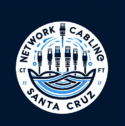What Type of Cable Is Used for Internet? A Complete Guide to Choosing the Right One
If you’ve ever wondered what type of cable is used for internet connections, you’re not alone. With so many different types available — from coaxial to fiber optic to Ethernet — it can get confusing fast. The truth is, the best cable for your internet depends on your speed needs, your setup, and how your network is designed.
In this guide, we’ll break down the most common types of internet cables, how they work, and which one is right for your home or business. Our team of professional network cabling installers in Santa Cruz ensures that every connection is reliable, secure, and optimized for high-speed internet performance.
Understanding Internet Cables
Internet cables are the physical pathways that carry data between your modem, router, and connected devices. Each cable type transmits data differently, which affects your internet speed, stability, and signal quality.
The three main types of internet cables are:
- Ethernet (Twisted Pair) cables
- Coaxial cables
- Fiber optic cables
Let’s take a closer look at each one.
1. Ethernet Cables (Twisted Pair Cables)
Ethernet cables are the most common type used for wired internet connections in homes and offices. They connect computers, routers, and switches, creating a stable and high-speed local area network (LAN).
There are several categories (or “Cat” ratings) to choose from:
- Cat5e: Supports speeds up to 1 Gbps — suitable for most home networks.
- Cat6: Handles up to 10 Gbps over shorter distances (up to 55 meters).
- Cat6a: Enhanced version of Cat6 — better shielding and supports 10 Gbps over longer distances.
- Cat7 / Cat8: Designed for data centers and high-performance networks; supports speeds up to 40 Gbps and higher frequencies.
Why choose Ethernet?
- Stable and consistent speeds
- Secure connection
- Minimal interference
- Affordable and easy to install
For most homes and small businesses, Cat6 or Cat6a cabling offers the best balance between performance and cost.
2. Coaxial Cables
Coaxial cables, or “coax,” are widely used by internet service providers (ISPs) for cable internet connections. They deliver data through a central copper conductor surrounded by shielding, which protects against interference.
These cables connect from your ISP’s line to your modem, often seen in homes that use cable TV or broadband internet.
Advantages:
- Widely available and durable
- Handles both TV and internet signals
- Easy to install and maintain
Limitations:
- Speeds can vary depending on your provider’s shared network
- Not ideal for high-speed or symmetrical uploads and downloads
Coaxial internet works well for general use, streaming, and browsing, but if you need ultra-fast speeds for business or gaming, fiber or Ethernet is a better choice.
3. Fiber Optic Cables
Fiber optic cables are the fastest and most advanced option for internet connectivity. They transmit data using light signals through strands of glass or plastic fibers, offering unmatched speed and reliability.
Two main types of fiber cables:
- Single-mode fiber (SMF): Used for long-distance, high-speed communication
- Multi-mode fiber (MMF): Used for shorter distances, typically inside buildings
Benefits of fiber internet:
- Ultra-fast speeds (up to 100 Gbps and beyond)
- Symmetrical upload and download speeds
- Immune to electromagnetic interference
- Future-proof for upcoming technology demands
Fiber is ideal for large offices, data centers, and modern smart homes that rely heavily on cloud systems and streaming services. There are several kinds of cables used for internet connectivity. You can explore the four main types of network cables to understand which one suits your needs best.
Which Cable Type Is Best for You?
Choosing the right internet cable depends on your needs:
| Usage Type | Recommended Cable | Speed Range | Notes |
|---|---|---|---|
| Home browsing and streaming | Cat5e / Coaxial | Up to 1 Gbps | Budget-friendly and widely available |
| Small business network | Cat6 / Cat6a | Up to 10 Gbps | Ideal for multiple users and devices |
| Enterprise or data center | Cat7 / Fiber Optic | 10–100 Gbps+ | Highest performance and reliability |
| Smart home setups | Cat6a / Fiber | Up to 10 Gbps | Great for automation and security systems |
If you’re building or upgrading your network, installing structured cabling with Cat6 or fiber optic cables ensures your internet setup is future-ready and stable.
Professional Installation Matters
No matter which type of internet cable you choose, professional installation makes all the difference. Certified technicians ensure:
- Proper routing and termination
- Compliance with local codes and standards
- Cable testing for performance and safety
- Neat and organized layouts for easy maintenance
A correctly installed cabling system prevents data loss, interference, and costly rework down the line.
Final Thoughts
The type of cable used for internet depends on your speed requirements and setup. For most modern homes and offices, Ethernet (Cat6) or fiber optic cables provide the best performance and reliability.
If you’re not sure which cable fits your needs, a local network cabling expert can assess your space, recommend the best option, and handle the installation professionally. While some cables are optimized for internet data, others are used in broader communication setups. Learn more about which cables are best for communication systems.
Upgrade your connection today — and enjoy fast, stable, and secure internet built to last.
